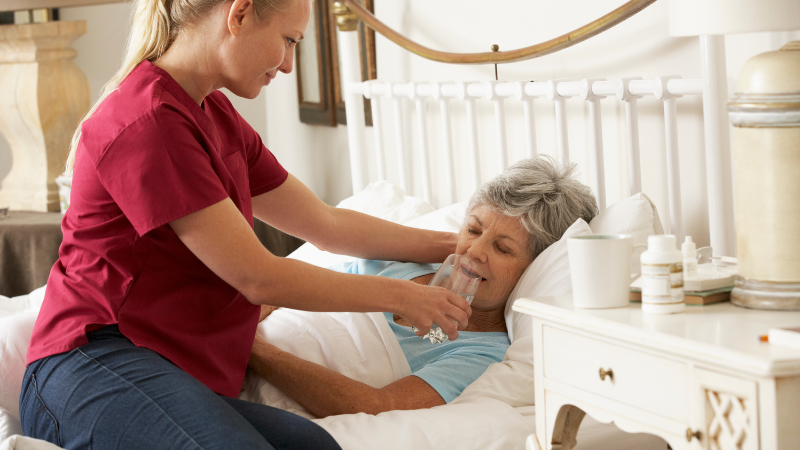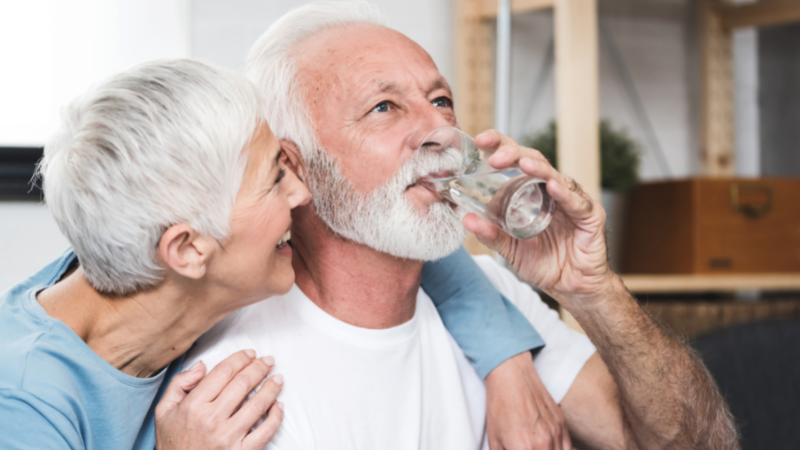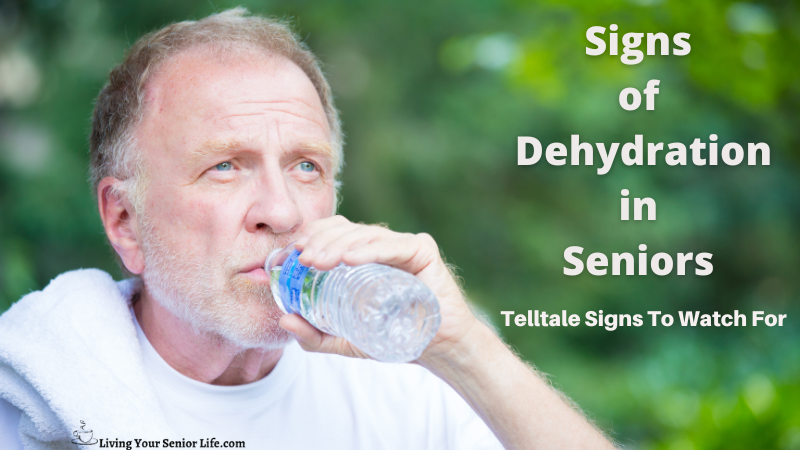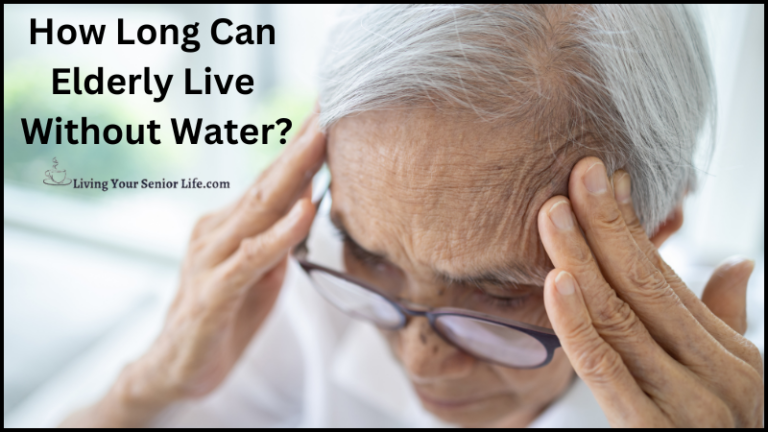Dehydration is a common condition among seniors that can severely impact their health. In this article, you will learn about the signs of dehydration in seniors and what you can do to prevent and treat dehydration. We will also provide tips on managing dehydration in elderly patients and some advice on monitoring and treating dehydration symptoms.
Understanding dehydration is crucial to maintaining good health in seniors. By knowing the causes, signs, and risk factors of dehydration, you can take steps to prevent and treat this condition. This article will help you stay well-hydrated and healthy, so keep reading to learn more.
Key Takeaways:
- Dehydration is a common condition among seniors that can severely impact their health.
- Understanding the causes, signs, and risk factors of dehydration is crucial to maintaining good health in seniors.
- By taking steps to prevent and treat dehydration, you can stay well-hydrated and healthy.
Video: Signs of Dehydration in Seniors
Understanding Dehydration
Dehydration happens when your body loses more fluid than it takes in, making it difficult for your body to perform its normal functions. It is the most common electrolyte imbalance in the world and affects people of all ages. To avoid dehydration, it is important to stay hydrated by drinking enough fluids that meet your hydration needs. Water plays a crucial role in many functions of your body, so it is important to ensure that you are getting enough fluid to stay hydrated.
Causes of Dehydration
Dehydration can be caused by various factors. Forgetting to hydrate, feeling sick, and not rehydrating after exercise are common causes of dehydration. Other causes include vomiting, diarrhea, extreme sweating, fever, excessive urination, and low blood pressure. Certain medications such as diuretics and blood pressure medications can also cause dehydration. Infections and illnesses can also lead to dehydration. Heat exhaustion and heatstroke, as well as alcohol consumption, can also cause dehydration.
Symptoms of Dehydration

Dehydration is a serious health issue that can lead to severe complications if left untreated. It is essential to recognize the signs of dehydration to prevent any adverse effects. Here are some common signs and symptoms of dehydration in seniors:
- Dark Colored Urine
- As the fluid in the body decreases, urine becomes less diluted, causing it to become darker.
- Decreased Urination
- As dehydration progresses, the kidneys lose water more rapidly, leading to decreased urination.
- Difficulty Breathing
- Dizziness
- Dry Mouth
- Fatigue
- Feeling Faint or Lightheaded
- Headache
- Increased thirst
- As dehydration worsens, the thirst receptor activates more intensely, leading to increased thirst and dehydration.
- Nausea and Vomiting
- Rapid Heart Rate
- Sluggishness
Other dehydration symptoms include confusion, sweating, constipation, muscle cramps, sunken eyes, low blood pressure, dry skin, irritability, weakness, and fainting. Mild dehydration can be treated by drinking water or electrolyte drinks. However, severe dehydration requires immediate medical attention.
Dehydration can become dangerous and even fatal. If dehydration is suspected contact your medical professional immediately for evaluation.
Risk Factors
Dehydration is a common problem in seniors that can lead to several health problems. There are several risk factors that can lead to dehydration. Here are some of the risk factors that you should be aware of:
Age
- As you age, your body’s fluid reserve decreases, and your ability to conserve water also decreases. Additionally, your sense of thirst becomes less acute, which can make it difficult to recognize when you are dehydrated.
- Infants and children are also at greater risk for dehydration as they are the age group most likely to suffer from severe diarrhea and vomiting, leading to a loss of fluids. Plus, they aren’t able to verbalize that they are thirsty.
Chronic Illnesses
- If you have chronic illnesses such as diabetes or kidney disease, you are at a higher risk of dehydration. Medications that increase urination can also increase your risk of dehydration. When you are sick, you often don’t feel like eating or drinking, which can lead to dehydration.
Exercise
- When you exercise, you sweat, and if those fluids aren’t replaced with water, dehydration can occur. Before exercising, drink some water. Continue to drink water or other liquids regularly during and after exercise to replace the lost fluids and avoid overheating.
Lack Of Water Intake
- This is the most common risk factor for dehydration in seniors. If you aren’t drinking enough water, your blood pressure and blood sugar will drop, and you’ll become more susceptible to dehydration and other health problems.
Poor Oral Hygiene
- Poor oral hygiene can lead to dehydration because it increases the risk of mouth infections and possibly cold sores, making drinking water difficult.
Poor Nutrition
- If your diet doesn’t contain enough water-rich foods, you may be at risk of dehydration.
Working Outside
- If you work outside, dehydration and heat illness are more likely to occur with hot weather and when it’s hot and humid. Sweat can’t evaporate as quickly when the air is humid, resulting in a higher body temperature and the need for additional fluids.
It is important to be aware of these risk factors and take steps to prevent dehydration. Make sure you are drinking enough water, especially during hot weather or when you are sick. If you have a chronic illness, talk to your doctor about how to manage your condition and prevent dehydration. If you work outside, take frequent breaks in a cool, shaded area and drink plenty of water. By taking these steps, you can reduce your risk of dehydration and stay healthy.
Treating Dehydration
Treating dehydration involves replenishing the fluids that have been lost. Drinking water or other fluids such as juices or broth is recommended for mild to moderate dehydration. In cases where vomiting or diarrhea causes significant electrolyte and water loss, drinking electrolyte-rich beverages like sports drinks and Pedialyte can be beneficial. For severe dehydration, hospitalization may be necessary, and fluids and electrolytes will be given intravenously.
It is important to seek medical attention if symptoms persist or worsen, especially in the elderly. Doctors may perform urine tests to assess kidney function and determine the severity of dehydration. In life-threatening emergencies, call 911 or go to the nearest emergency department.
Preventing Dehydration

Staying hydrated is important for overall health and well-being. To prevent dehydration, make sure to drink plenty of water throughout the day, even if you’re not thirsty. You can also include fluids like tea, soup, fruits, vegetables, and juice in your diet. Avoid sugary drinks, alcohol, and caffeinated beverages. Additionally, be aware of how much fluid you’re losing each day and take proper steps to maintain hydration levels. Exercising and sweating can increase your fluid loss, so it’s important to drink water and sports drinks to replenish lost fluids. Adding a pinch of salt to your water or soups can also help you stay hydrated.
Complications
Dehydration can lead to severe complications, including electrolyte imbalances, shock, and even coma or death. Seniors who are dehydrated are at a higher risk for developing chronic constipation, urinary and kidney problems, infectious diseases, and cognitive impairment. Fatigue, dizziness, and headaches are common symptoms of dehydration. Seek medical attention immediately if you experience any of these symptoms.
A study published in PMC PubMed Central reported that dehydrated seniors are at a higher risk for developing chronic constipation, urinary and kidney problems such as kidney stones, infectious diseases, and cognitive impairment.
Frequently Asked Questions About Dehydration
What are the consequences of dehydration in seniors?
Dehydration in seniors can lead to sweating, dizziness, nausea, vomiting, and thirst. It can also lead to reduced blood pressure, heart rate, and urine output. Additionally, seniors with dehydration may experience confusion, dry mouth, dry skin, headaches, and fatigue. Severe dehydration can lead to hospitalization and even death.
What should you do if you notice a senior is dehydrated?
If you notice a senior is dehydrated, it is important to take immediate action. First, place them on a bed, especially if dizzy or light-headed. Then, give them water and electrolyte drinks if available. If symptoms persist, call a health care professional. It is important to note that prevention is key, so encourage seniors to drink plenty of fluids throughout the day and avoid sugary or caffeinated drinks.
How long does it take for an elderly person to recover from dehydration?
The recovery time for dehydration in seniors depends on the severity of the dehydration. Mild dehydration can typically be treated with oral rehydration therapy and can take a few hours to one day to recover. However, severe dehydration can take several days to recover and may require hospitalization.
What are some diseases that can cause dehydration in older adults?
Dehydration in older adults can be caused by various diseases. Some of the common ones include:
Diabetes: High blood sugar levels can cause frequent urination, leading to dehydration.
Kidney Disease: Kidneys play a crucial role in regulating fluid balance in the body. Any damage to the kidneys can cause dehydration.
Dementia: People with dementia may forget to drink water, leading to dehydration.
Cancer: Chemotherapy and radiation therapy can cause nausea, vomiting, and diarrhea, leading to dehydration.
Additional Reading
Conclusion
Proper hydration is crucial for maintaining good health and well-being. Fortunately, staying hydrated is an easy task that can be accomplished by drinking plenty of water throughout the day. Dehydration is a common problem among seniors and can have serious consequences if left untreated. Seeking medical attention as soon as possible is important if you or a loved one are experiencing any signs or symptoms of dehydration.
Signs of dehydration in seniors include a dry, sticky mouth, infrequent urination, dark-colored urine, unexplained tiredness, dizziness or lightheadedness, and confusion. If you or a loved one is experiencing any of these symptoms, do not wait to seek medical attention.
Remember, staying hydrated is crucial for your health and well-being, so drink up!
Have you experienced dehydration? What steps did you take to bring your hydration levels back to normal? Please comment below.










